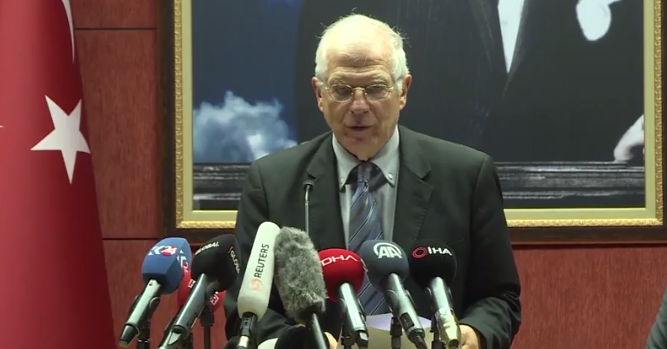Turkey: Remarks by the High Representative/Vice-President Josep Borrell following his visit in Turkey
Good morning to everybody,
I had an intense visit and a lot of talks with the Turkish authorities yesterday and today.
Together with my colleague, Commissioner [for Crisis Management] Janez Lenarčič we came to discuss the situation in Syria, the catastrophic humanitarian situation in Idlib and the serious consequences that all that has for Turkey and for the European Union.
Read also
I met with the Minister of Defence [of Turkey, Hulusi Akar], the Minister of Interior [Süleyman Soylu], and today, together with my colleague, Commissioner [for Crisis Management, Janez Lenarčič], we met with the Vice-President [Fuat] Oktay and with the Foreign Affairs Minister [Mevlüt Çavuşoğlu]. At the same time, Commissioner Lenarčič visited some projects funded by the European Union here in Turkey to support Syrian refugees.
This morning I had the opportunity to accompany the President of the European Council, Charles Michel to his visit to President [of Turkey, Recep Tayyip Erdoğan]. [It was] a long talk and a very constructive conversation between the two leaders.
In all our meetings I had the opportunity to express our understanding for the difficult situation Turkey is currently facing. But also I stressed that the current developments at the European borders are not leading to any solution.
Increased pressure at the European Union – Turkey border and unilateral actions are not bringing any positive answer. They are not bringing benefit to anyone. On the contrary it can only create problems and make the situation worse. And the ones who will pay the price are the people – the Syrian refugees and migrants.
We also talked a lot about the situation in Idlib. Turkey and the European Union, have a common interest to end the conflict in Syria. We need to work hand in hand to address the common challenges. We need to cooperate in order to find a way to achieve this conflict. The situation is dramatic. The humanitarian consequences of military escalations are extremely grave. Humanitarian access needs to be urgently granted.
This is why today with my colleague the Commissioner in charge of crisis management [Janez Lenarčič] we have announced an additional €170 million in humanitarian aid to continue assisting the most vulnerable people in Syria, and among this money there are €60 million specially addressed to the humanitarian crisis in north-west Syria. The problem there is not funding, the problem is logistics, the problem is how to reach through the border, in a situation which is in the middle of the war, making every day more difficult to bring help to the people who need it.
Both Presidents [Charles Michel and Recep Tayyip Erdoğan] have been talking a lot about how to promote de-escalation in Syria and we have also asked not to encourage further movement of refugees and migrants towards the European Union borders.
Contacts at the highest level will continue. Now I am travelling to Zagreb to discuss with my colleagues the Foreign Affairs Ministers of the EU Member States tomorrow and on Friday about the situation in Idlib and our relations with Turkey which have to be revisited in order to try to clarify some misunderstandings and work for a better cooperation.
We need to bring a new dynamic into the European Union relations with Turkey. This will contribute to address the situation in Syria, to look for a solution on the crisis, and improving the overall international security, which has been strongly jeopardised by the last events.
I would like to thank all Turkish authorities for their warm welcome and for their frank and constructive talks.
Thank you.
Q&A
Q. When you informed the President [of Turkey] and you gave messages so that there will not be new migrants moving and encouraged to go to the border areas, what was the response by the President?
The answer is that they are not encouraging people moving to the border, but they cannot prevent people from doing so.
And we have to try to avoid, by all means, that people believe that the border with Europe is open and that just by presenting themselves in front of the border we will allow them to pass by, because this is not the case. People can be misled and can make a dangerous travel, affording risk and going into difficulties without any kind of reward.
Q. We are receiving news that the 18 March agreement between Turkey and the EU will be updated, that there is a package of 9 articles that is being prepared, plus a new assistance package for Turkey. And also a new system for the migrants that are going to pass to Europe from Greece. What kind of package is foreseen?
The 2016 package was not only a matter of providing financial help to take care of the migrants on the Turkish soil, but also a series of measures that go from visa liberalisation to the modernisation of the customs union, and many other things. Many of them have not been fulfilled yet.
From the financial point of view, there are €6 billion that we foresee to disburse. I discussed with our Turkish friends from several ministries and we agreed on the figures. And the figures are that until today we have contracted €4.7 billions and there have been disbursed, paid in cash terms, €3.2 billions. The others are on the pipeline, and they will be disbursed during this year. But this facility has been very useful to support the refugees in Turkey and it is something that, for sure, is not going to finish at the end of this year, because the problem has not been solved. On the contrary, the situation in Idlib, which was not taken into consideration in 2016, now appears as an additional source of potential migrants and it calls for a continuous help, contribution and cooperation from the European Union.
Link to the video: https://audiovisual.ec.europa.eu/en/video/I-185667
European Union
























































